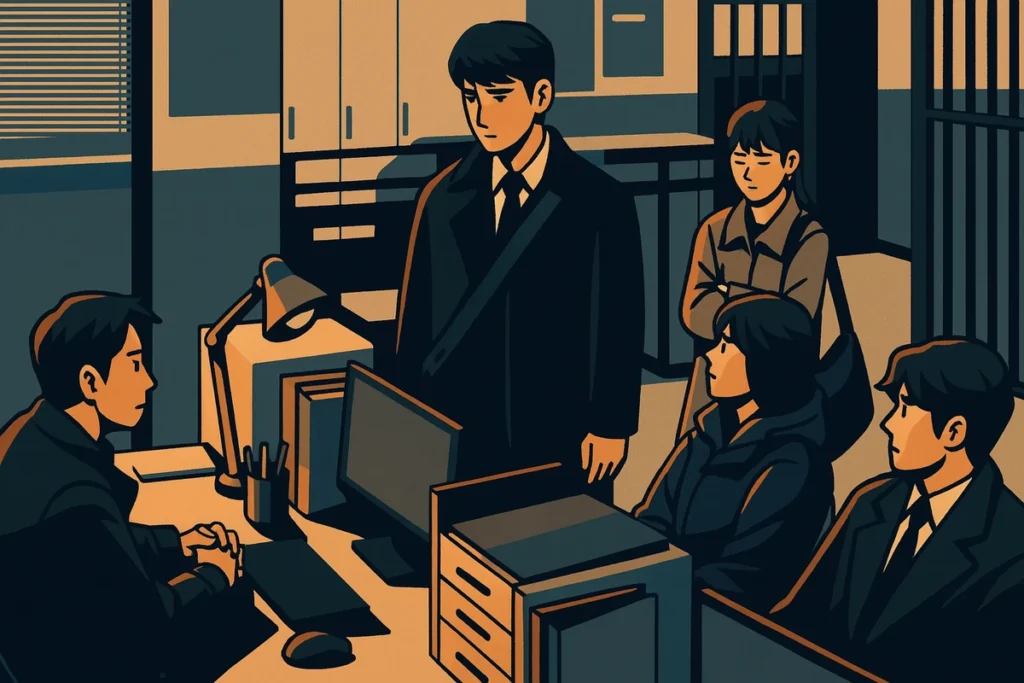[Image Source] AI illustration by DALL·E
TL;DR – Sometimes fear wears a polite face.
In this chilling but quiet scene from When Life Gives You Tangerines, a child is drawn into increasingly strange requests by a woman who seems kind—but isn't.
As the tension builds through errands and silence, the girl's mother appears without a word, led not by logic but by instinct—what Koreans call 촉.
This moment reveals how Korean drama uses omission, politeness, and subtle cues to portray danger. Sometimes, it's not the scream—but the stillness—that saves you.
📢 To protect copyright, all dialogue has been rephrased while preserving the original context. I appreciate your understanding.
1. Scene Snapshot
A dusty village alley, a girl with good intentions, and a woman with bad ones. In this tense and poignant scene from “When Life Gives You Tangerines,” young Ae-soon is approached by a mysterious woman who hands her large bills and asks for change. At first, it seems harmless—just a tired adult asking a child for help. But as the errands get stranger and the woman more manipulative, something shifts. Ae-soon begins to feel it, even if she doesn’t have the words for it yet.
Then, like a silent warning system, her mother appears. Not by chance—but by instinct. That’s where the drama hits hardest: in the quiet dread of something almost happening. This is a masterclass in Korean emotional storytelling, where tension builds through tone, omission, and social cues.
📺 Watch the original scene here
[Source] YouTube, 드라마잼
2. Micro-Dialogue
가게에서 뭐라고 하던?
What did the shopkeeper say?
안 주셔도 괜찮아요.
You don’t have to give me anything.
그럼 이번에만 한 번 더 바꿔 줄 수 있어?
Then, can you exchange it just one more time?
여기서 뭐 하는 거야?
What are you doing here?
엄마의 촉이라는 게 참 무서워.
A mother’s intuition is compelling.
3. Culture & Subtext
This short scene distills several layers of Korean cultural tension into a single moment: a child caught in a moral trap, an adult testing boundaries, and a mother acting on gut instinct. In Korean society, children are often raised to “말을 잘 듣다”—to be obedient. Ae-soon doesn’t question the woman’s strange requests at first. Her hesitation only grows when the rewards get bigger. That’s the quiet terror: being polite in the face of something wrong.
Then there’s the concept of “촉.” In Korean, intuition—especially a mother’s—is revered almost supernaturally. When Ae-soon’s mother appears and intervenes, the script doesn’t need her to shout. Her presence alone is enough to dismantle the danger. This isn’t a thriller. It’s realism. And that’s what makes it so chilling.
These days, violent crimes have significantly decreased, but in Korean society during the 1960s and 1970s, serious crimes such as child abductions were more common. This scene reflects the social reality of that era.
❓ FAQ (Frequently Asked Questions)
Q1. Why does Ae-soon follow the strange woman’s requests without hesitation?
In Korean culture, children are taught to be polite and obedient (말 잘 듣다), especially to adults. Even if something feels off, social pressure and fear of being rude can override instinct—especially for young kids.
Q2. What exactly is “촉” and how is it different from just ‘gut feeling’?
“촉” is more than instinct—it’s almost revered in Korean culture, especially when it comes from mothers. It suggests emotional intelligence sharpened by experience, not just random intuition. When Ae-soon’s mom shows up, it’s not a coincidence. It’s 촉 at work.
Q3. Is the woman in the scene portrayed as a criminal or just weird?
Reddit and Korean forums agree: she’s a manipulative figure. She’s not violent, but she uses kindness and money to test how far she can push the child. It taps into real fears Koreans had in the ’60s–’70s about child luring and grooming. Could the woman be a potential criminal who failed to commit a crime?
Q4. What does “등골 시리다” actually mean, and when do Koreans use it?
It means “my spine feels cold,” but emotionally, it’s closer to “gives me the chills” or “creeps me out.” It’s used when recalling a disturbing memory or sensing something deeply wrong.
Q5. Why is the scene so quiet? Wouldn’t a Western version be louder?
That’s the point. Korean storytelling often builds tension with silence, omission, and emotional restraint. The mother doesn’t need to yell—her quiet arrival is louder than words.
4. Grammar in Action
Sentence 1
“네가 어렸을 때 제사 날 이상한 일이 있었잖아.”
🔍 Analysis
– 네가: 너 + subject marker 가
– 어렸을 때: 어리다 (to be young) + -었- past tense + attributive “-을” + 때 (time when)
➡️ 어리다 → 어렸다 → 어렸을 → 어렸을 때
– 제사 날: 제사 (ancestral rite) + 날 (day)
– 이상한 일: 이상하다 (strange) + attributive “-ㄴ” noun 일
– 있었잖아: 있다 (to happen/exist) + past tense “-었” + 잖아 (reminder tone)
➡️ 있다 → 있었다 → 있었잖아
📌 Example Usage
“어릴 적에 이상한 경험 한 번 있었잖아?”
“You remember that strange thing that happened when you were little, right?”
☀️ Meaning
Recalling a strange incident during a traditional family ceremony from childhood.
Sentence 2
“생각하면 등골이 오싹해.”
🔍 Analysis
– 생각하면: 생각하다 (to think) + -면 (when/if)
– 등골이: 등골 (spine) + subject marker 이
– 오싹해: 오싹하다 (to feel chills) + sentence ending “-아/어” (informal)
📌 Example Usage
“그 일 생각하면 몸이 오싹해.”
“Just thinking about that sends chills down my spine.”
☀️ Meaning
An expression of deep discomfort or fear triggered by memories.
Sentence 3
“가게 주인이 뭐라고 했어?”
🔍 Analysis
– 가게 주인: shop owner
– 이: subject marker
– 뭐라고 했어: 무엇이라고 하다 (to say what) + past tense casual
➡️✂️ 무엇이라고 하다 → 뭐라고 하다 (contraction) → 뭐라고 했다 (past tense) → 뭐라고 했어 (informal sentence ending)
📌 Example Usage
“그 사람이 뭐라고 말했어?”
“What did that person say?”
☀️ Meaning
Asking for information about what was said.
Sentence 4
“안 주셔도 괜찮아요.”
🔍 Analysis
– 안: negation
– 주셔도: 주다 + honorific suffix -시 + -어도 (even if)
– 괜찮아요: 괜찮다 (to be okay) + polite ending
📌 Example Usage
“굳이 안 주셔도 돼요.”
“You really don’t have to give it.”
☀️ Meaning
A polite refusal or reassurance.
Sentence 5
“그럼 이번에만 한 번 더 바꿔 줄래?”
🔍 Analysis
– 그럼: then, if so
– 이번에만: 이번 + only
– 한 번 더: one more time
– 바꿔 줄래: 바꾸다 + -어 주다 (do for someone) + request ending
📌 Example Usage
“그럼 이번 한 번만 더 부탁할게.”
“Then please do it just one more time.”
☀️ Meaning
A polite request to repeat a favor.
5. Natural Korean Toolkit
눈치 보이다 → to feel self-conscious, to worry about how others perceive your actions
심부름값 → small compensation for running an errand
등골이 오싹하다 → to feel a chill down your spine, from fear or stress
도라꾸 → old slang for “truck” often used in rural dialect
착하고 순하다 → gentle and kind; used for children or pets
Try swapping:
착하고 순하다 → 착하고 얌전하다 / 순하고 말 잘 듣는 아이야
Kind and gentle → Kind and quiet / A gentle child who listens well
가게방 → 뒷방, 안쪽 방, 사장님 방
Store room → Back room, inner room, boss’s room
눈치 보이다 → 신경 쓰이다, 주눅 들다
To act self-conscious → To feel uneasy, to feel intimidated
6. Quick Quiz or Expression Drill
1) 이상한 기운이 느껴질 때, 당신의 반응은 __________.
2) 어릴 때 어른이 돈을 주며 부탁하면 __________.
3) “안 주셔도 되는데요?”는 어떤 말투?
4) 누군가가 “말도 잘 듣지?”라고 하면 의도는?
5) 엄마가 말 없이 나타났다면, 그건 __________.
🎥 More from This Drama? Let’s Keep Learning Korean! - Currently writing
Loved this scene? There’s more where that came from. Check out other moments from the same drama—each packed with new Korean phrases, cultural vibes, and teachable emotions.
- 🔖 “When Life Gives You Tangerines”: How Korean Drama Captures Painful Family Love
- 🔖 Korean Intuition Explained: Why Do Moms Sense Danger First?
Answers
1) 이상한 기운이 느껴질 때, 당신의 반응은 촉을 믿어야 해.
→ When you sense something strange, you should trust your instincts.
2) 어릴 때 어른이 돈을 주며 부탁하면 눈치 보면서도 한다.
→ When an adult gives you money and asks a favor, even as a child, you go along with it while feeling self-conscious.
3) “안 주셔도 되는데요?”는 어떤 말투? 공손하지만 망설이는 거절.
→ “안 주셔도 되는데요?” is a polite but hesitant refusal.
4) 누군가가 “말도 잘 듣지?”라고 하면 의도는? 순종적인지 떠보는 거야.
→ When someone says “말도 잘 듣지?”, they’re testing whether you’re obedient or naive.
5) 엄마가 말 없이 나타났다면, 그건 이미 촉이 작동 중이란 뜻.
→ If Mom shows up without a word, it means her gut instinct is already at work.


